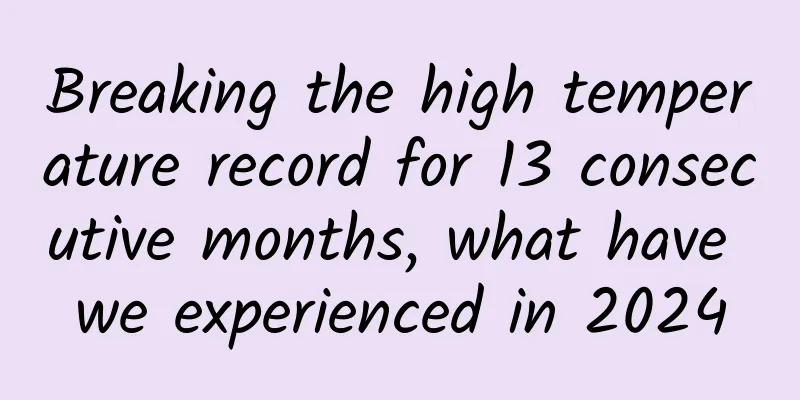Breaking the high temperature record for 13 consecutive months, what have we experienced in 2024

|
2024 is already in the past. In the past year, we have experienced record-breaking high temperatures and super typhoons, and we have increasingly felt the impact of climate change on each of us. In this article, we review some of the major environmental events that occurred in 2024. In addition to the worrying bad news, there are actually some good news that brings hope. The hottest year 2024 was the hottest year on record, breaking the high temperature record set in 2023. At the same time, the past decade has also been the hottest in history. Global average temperature from 1940 to 2024 (based on pre-industrial average temperature); the figure is drawn in December, so the 2024 data is based on data from January to November | Copernicus Climate Change Service/ECMWF Records have been broken since the beginning of the year, with January 2024 being the hottest January since data records began in 1940. Moreover, starting in June 2023, the average temperature in each month broke the historical record for that month , and this trend continued until June 2024. From June 2023 to June 2024, the global average temperature broke the record for the month for 13 consecutive months|Copernicus Climate Change Service/ECMWF On July 22, 2024, the world experienced its hottest day . The global average temperature on that day was 17.16°C, surpassing the previous record of 17.09°C and 17.08°C on July 6, 2023. Even in most parts of Antarctica, the temperature this summer was higher than the average, and in some areas it was more than 10°C higher than the historical average. Along with high temperatures come extreme climate events . In January, the United States experienced record low temperatures; in June, the Atlantic Ocean saw the earliest recorded Category 5 hurricane; in November, floods caused by heavy rains hit Spain hard... According to the World Meteorological Organization, climate change caused at least 3,700 deaths and millions of people were displaced in the 26 climate events they studied, and this is only a small part of the 219 climate events throughout the year. Most of the extreme climate events in early 2024 are related to the El Niño phenomenon, but their research shows that climate change plays a greater role. 2024 is also the hottest year in China since records began in 1961. Last year, there were eight large-scale high-temperature processes across the country, and the extremely fierce "autumn tiger" made September to November the warmest autumn on record. Changes in the average temperature and number of high-temperature days in summer and autumn (June-November) across the country since 2000|Map by Su Jiexi and Liu Lu According to the World Meteorological Organization, the global average surface temperature from January to September 2024 was 1.54°C higher than pre-industrial levels. Whether the annual average temperature has exceeded the 1.5°C target set in the Paris Agreement for the first time will still have to wait for the full-year comprehensive data released later this month to know - but there is not much time left for us to make changes. War leads to environmental degradation In 2024, wars are still raging in many parts of the world. Not only are people displaced, but the environment in conflict areas is also deteriorating. The Gaza Strip is the focal point and frontline of the Israeli-Palestinian conflict. An environmental assessment released by the United Nations Environment Programme in June 2024 showed that the region has been engulfed by unprecedented pollution . It is estimated that the conflict has left about 3.9 million tons of rubble. In Gaza, more than 107 kilograms of rubble are piled on every square meter of land. The rubble contains unexploded ordnance, asbestos, industrial and medical waste, etc., making the cleanup work complicated and arduous. The Gaza Strip is covered in rubble|unep.org Gaza’s water supply system has almost completely collapsed, and five local sewage treatment plants have ceased to operate. Untreated sewage contains a large number of pathogens, contaminating coastal waters and freshwater resources, posing an immediate and long-term threat to human health, marine ecology and arable land. At the same time, Gaza's solid waste management system has been severely damaged by the conflict, and garbage cannot be properly disposed of. In November 2023, about 1,200 tons of garbage piled up around shelters every day. Fuel shortages have forced families to use wood, plastic and other waste for cooking, further exacerbating air pollution and health risks. COP29 is shrouded in a dark cloud In November 2024, the 29th United Nations Climate Change Conference (COP29) was held in Baku, the capital of Azerbaijan. The UN climate summit aims to assess the progress of global warming and propose solutions. The Kyoto Protocol and the Paris Agreement are the results of previous years' meetings. However, COP29 did not go smoothly . COP29|the President of Azerbaijan "Money" is the keyword of COP29 , which hopes to provide climate finance to developing countries, especially small island developing countries and least developed countries, to help them cope with climate change and transform to a low-carbon economy. At the Copenhagen Climate Conference in 2009, developed countries promised to provide at least $100 billion in climate funds to developing countries each year before 2020 - a promise that was not fulfilled for the first time until 2022. According to estimates by independent experts, developing countries excluding China will need $1.3 trillion in climate finance support each year by 2035. However, after two weeks of negotiations, the final agreement only reached $300 billion : the agreement requires developed countries to provide $300 billion in climate finance to developing countries each year, and calls for the achievement of a $1.3 trillion climate finance target by 2035. Many developing country delegations were disappointed because of the huge gap between the target and the agreement, and some called it a "weak and insulting agreement." Moreover, it is not clear how much of the $300 billion is a grant or an interest-free loan, and no one knows how much debt these climate finances will burden developing countries with. Participants call for climate finance | Kiara Worth / United Nations Framework Convention on Climate Change Secretariat At COP29, countries also agreed on global carbon credit trading rules; however, critics believe that the carbon market is not conducive to reducing carbon emissions and that the fossil fuel industry will evade responsibility through carbon offsets. COP28, held in 2023, called on countries to reduce their dependence on fossil fuels, but there was not much substantive progress in energy transformation at COP29. Many unresolved issues remain at COP30, which will be held in Brazil at the end of this year. Young people from small island nations push for climate justice From December 2 to 13, 2024, the International Court of Justice in The Hague, Netherlands, held its first public hearing on the case of " Advisory Opinion on State Obligations in Respect of Climate Change ", which is the largest case accepted by the International Court of Justice since its establishment. Pacific island countries believe that climate change puts their survival at risk and demand that major emitting countries be held accountable. The island countries in the Pacific are victims of the injustice of climate change. These developing countries have historically had low carbon emissions, but they are suffering from the catastrophe brought by climate change - islands may be submerged by rising sea levels, people are constantly hit by hurricanes, and they often lack the ability to cope with climate change. In 2022, the Pacific island country of Tuvalu even announced that it was considering digitizing the country's appearance, so that even if the country is submerged by sea water, it can still be with people in the digital network. Don't let global warming ruin our future | Peter Dejong Climate negotiations are stagnant. In addition to being frustrated and discouraged, a group of young people decided to do something. Cynthia Houniuhi, a law student at the University of the South Pacific, is the initiator of this issue. In her junior year, during a lecture, the teacher challenged the students to think about how to use the law to design climate action. During the discussion, someone mentioned the International Court of Justice. From then on, the students realized that climate justice should not be just a theory. In March 2019, 27 law students from the University of the South Pacific from eight Pacific island countries jointly launched Pacific Island Students Fighting Climate Change to push Pacific island leaders to bring climate change and other issues to the International Court of Justice . Students went out of their own countries and talked to peers in different regions to see who also wanted to bring the matter to the United Nations. In this way, isolated islands were connected. Since student organizations cannot propose resolutions directly at the United Nations, they must do so through countries. Vanuatu was the first country to show interest in the initiative. Starting with Vanuatu, the youth enlisted 18 countries to work as a core group to write the draft text. In March 2023, Vanuatu submitted the resolution and the first hearing was held in December 2024. While the ICJ’s decision is not binding and cannot directly compel wealthy countries to act, it is not only a symbol but could also form the basis for other legal actions. Big growth in renewable energy Another piece of good news is renewable energy. Renewable energy now accounts for more than 30% of the world’s electricity supply, according to energy think tank Ember, and the International Energy Agency predicts that over the next five years, the world will add more than 5,500 gigawatts of renewable energy capacity , equivalent to the current total installed capacity of China, the European Union, India and the United States combined. By 2030, solar and wind power will account for about 95% of new installed capacity. China will become the leader in renewable energy and will contribute 60% of the total global expansion . The International Energy Agency pointed out that this success is due to China's strong support for large-scale and distributed renewable energy (distributed energy refers to electricity generated near the point of use rather than supplied by centralized power plants). In addition, the report also mentioned that hydrogen energy's contribution to the expansion of renewable energy is still negligible. Wind farm technicians perform their annual inspection of a wind turbine | Joan Sullivan / Climate Visuals Countdown Although the growth of renewable energy has exceeded the targets set by many countries for 2030, it still falls short of the goal of doubling the growth set by COP28. The International Energy Agency called on countries to stop developing new gas and oil field projects , emphasizing that this is the only viable way to achieve the 1.5°C net zero emissions target. Future Contract In September 2024, the United Nations Future Summit was held in New York, and leaders of various countries adopted the "Compact for the Future" and its annex, the "Global Digital Compact" and the "Declaration for Future Generations". The Future Summit stems from the 2021 report "Our Common Agenda" by UN Secretary-General António Guterres. The report proposes " to fundamentally rethink political, economic and social systems to make them fairer and more effective for everyone". He sees the Future Summit as a decisive moment and hopes to reach consensus on the most critical necessary improvements. Future Summit|United Nations Photo The "Compact for the Future" adopted at the Future Summit proposed 56 action plans covering five areas: "sustainable development and financing for development", "international peace and security", "science, technology, innovation and digital cooperation", "youth and future generations" and "transforming global governance". It was called a milestone agreement by the United Nations . In terms of sustainable development and development financing, in addition to poverty eradication, gender equality, and the protection of human rights and fundamental freedoms, addressing climate change and protecting the environment are also important actions. Specific contents include: reaffirming the temperature target of the Paris Agreement, significantly, rapidly and continuously reducing greenhouse gas emissions, increasing adaptation funds to address climate change, universal coverage of multi-hazard early warning systems in 2027, promoting sustainable consumption and production patterns, accelerating the treatment of air, land and soil, freshwater and marine pollution, and implementing the framework for stopping and reversing biodiversity loss by 2030, etc. In addition to the "Compact for the Future", the United Nations will also implement some environmental protection initiatives in the future. For example, 2025 will be designated as the "International Year of Glacier Conservation" and March 21 of each year will be designated as "World Glacier Day". This initiative will allow more people to pay attention to the cryosphere and understand the important role of glaciers in regulating the global climate and providing fresh water resources. In addition, the World Climate Organization is promoting the "Global Greenhouse Gas Observation" plan, hoping to strengthen and coordinate the monitoring of greenhouse gases and provide a more solid scientific basis for climate action. In 2024, global environmental problems remain severe - high temperatures have broken records again, progress in addressing climate change and plastic pollution is far from expected, and wars are still raging. Fortunately, some people still stick to climate goals this year, the development of renewable energy still brings us some hope, and a group of young people have decided to take action, use their own power to promote justice, and participate in concrete changes. Perhaps 2024 is not an ideal year, but every tiny effort and every firm belief are accumulated strength for the future. 2025, will it be better? References [1]https://climate.copernicus.eu/copernicus-second-warmest-november-globally-confirms-expectation-2024-warmest-year [2]https://www.worldweatherattribution.org/when-risks-become-reality-extreme-weather-in-2024/ [3]https://www.cma.gov.cn/2011xzt/20160518/202412/t20241230_6766615.html [4]https://en.wikipedia.org/wiki/2024_United_Nations_Climate_Change_Conference# [5]https://www.un.org/zh/documents/treaty/A-RES-79-1 [6]https://science.caixin.com/2024-12-24/102271322.html [7]https://apnews.com/article/eu-world-court-icj-climate-global-warming-e954301f0258509f67e66ae2762da6f6 [8]https://earth.org/historic-global-growth-of-renewables-set-to-outpace-countries-2030-targets-but-fall-short-of-cop28-tripling-goal-iea-says/ [9]https://www.unep.org/news-and-stories/press-release/damage-gaza-causing-new-risks-human-health-and-long-term-recovery Author: Mai Mai, Yellowtail Pollock |
<<: Today is Minor Cold | The “spokesperson” of winter in the plant world has a southern “origin”?
>>: Don't play with your phone as soon as you open your eyes! Don't!
Recommend
How to quickly create a small program? How to create your own mini program?
How to quickly create a small program? How to cre...
The key project of the Chinese Academy of Sciences, "Research on Key Materials for Strategic Emerging Industries", passed the expert acceptance
Recently, the key project of the Chinese Academy ...
The algorithm recommendation mechanism of Toutiao and Douyin is not as "stupid" as people say on the Internet!
In 1865, on the flat land outside Yongdingmen in ...
Can eating more "blue foods" such as seafood solve the human food crisis?
Written by: Zhu Hengheng Editor: Wang Xinkai Layo...
A thorough explanation of fund e-commerce operation methodology
Let’s take a look at the ideas of public funds in...
Which website construction company is best? How to choose a website construction company?
Which website construction company is best in Don...
Wanqing's popular wealth creation course that everyone can copy, a simple, practical and replicable wealth action guide
Wanqing's popular wealth creation course that...
Whether a person is fat or not, look at the "roundness index", which is more reliable than BMI
People who care about their health have generally...
How to correct round shoulders and hunchback through training? 21-day training camp to improve round shoulders and hunchbacks Baidu Cloud download
How to correct round shoulders and hunchback thro...
B2B Marketing Channel Promotion——Baidu SEM
There are many types of B2B marketing, but online...
International Museum Day | Is visiting a museum tiring? Here are some tips for you!
Today is International Museum Day. Have you visit...
What are the functions of Foshan Insurance Mini Program? How much does it cost to develop a WeChat insurance mini program?
Not long ago, a colleague of mine bought another i...
Ace's 7th Universal Avatar Course 2021 [HD quality with brush courseware]
Ace's 7th Universal Avatar Course 2021 [HD qu...
Can artificial intelligence help us talk to our pets?
Author: Ma Lingshu Reviewer: Huang Chengming Inst...









